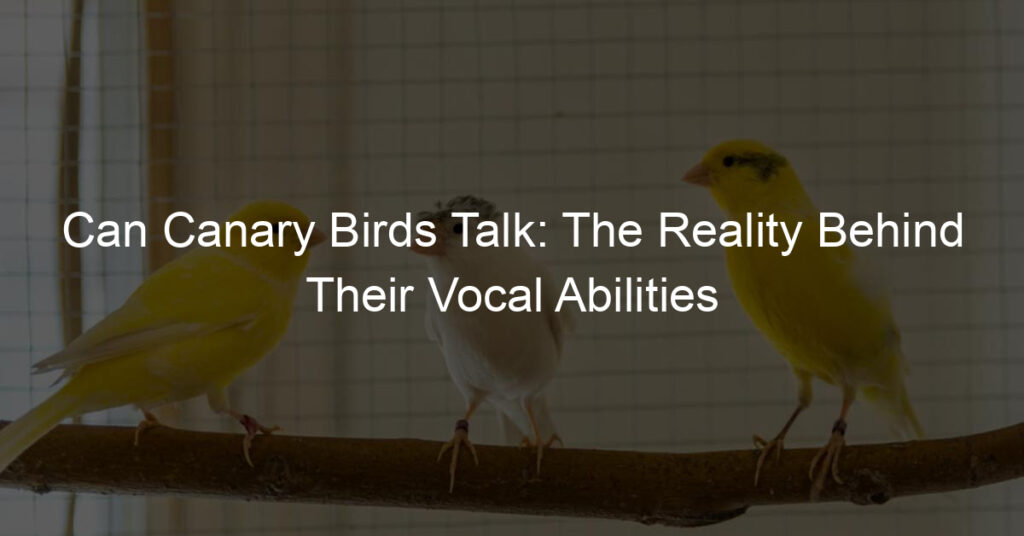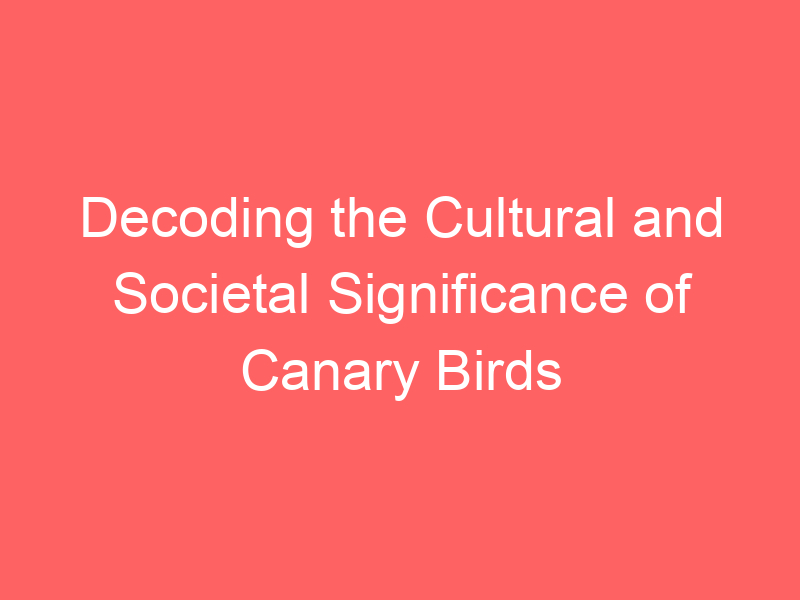Canary birds have been admired for their beautiful voices and unique melodies, often captivating bird enthusiasts and pet owners alike. As a result, it is not uncommon for people to wonder if these delightful birds can mimic human speech, similar to parrots and other talking birds.
In fact, a better understanding of can Canary birds talk and understanding their vocal abilities could lead to further appreciation and care for these feathered friends.
Canaries belong to the finch family and are known to primarily communicate through song, which can vary greatly among individual birds. Still, it is essential to understand whether these songs could be transformed into human-like speech or if canaries are capable of producing sounds beyond their natural repertoire.
Recognizing the factors that influence canary vocalizations and comparing them to other talking birds might yield fascinating insights into their potential abilities.
Key Takeaways
- Canary birds, known for their enchanting songs, raise curiosity about their ability to mimic human speech.
- Understanding canary vocalization factors allows for deeper appreciation and care of these feathered pets.
- Comparing canaries to other talking birds provides insights into their potential for human speech mimicry.
Can Canary Birds Talk?
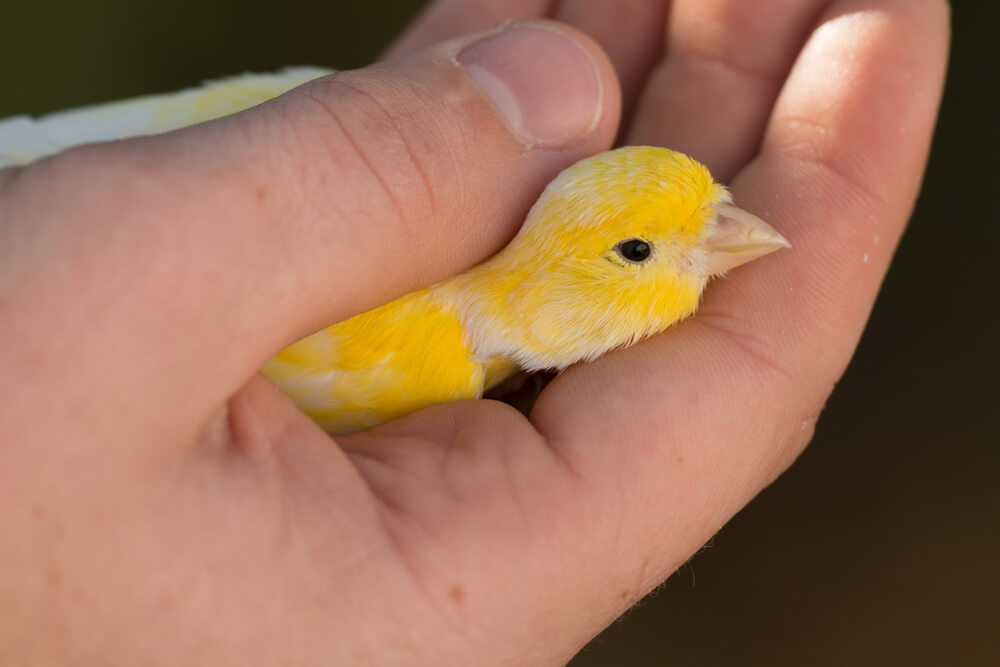
I have always been fascinated by canary birds, those beautiful, small pet birds belonging to the finch family. With their vivid colors and enchanting songs, they have captured the hearts of bird enthusiasts and pet owners alike.
In this section, I will discuss the intelligence of canary birds and explore whether they have the ability to talk.
Canary birds are indeed intelligent creatures. They possess a remarkable ability to learn and mimic sounds, which has led many bird owners to question if their canary pets can talk.
Although canary birds may not have the same linguistic abilities as some other talking bird species, such as parrots and African Greys, they can still imitate certain sounds and words if they are exposed to them frequently.
It’s important to note that not all canary birds will necessarily learn to talk. It often depends on the individual bird’s personality, as well as the effort and patience put in by the owner. When it comes to teaching a canary bird to talk, repetition is key.
The more the bird hears a specific word or sound, the more likely it is to mimic it.
Canary birds are known for their remarkable singing abilities. They have a complex and varied song repertoire, which they use for communication, courtship, and territorial defense. While their vocal range may not be as extensive as some other bird species, canary birds are still able to produce a wide variety of melodies and harmonies.
This musical talent, along with their intelligence, contributes to their potential to mimic speech.
In conclusion, canary birds are beautiful, intelligent pets with captivating songs. Although they may not be as skilled at talking as some other bird species, they can still learn to imitate certain sounds and words if given the proper training and exposure.
With patience and persistence, some owners have successfully taught their canary birds to talk, and you may be able to as well.
Canary Birds and Human Speech
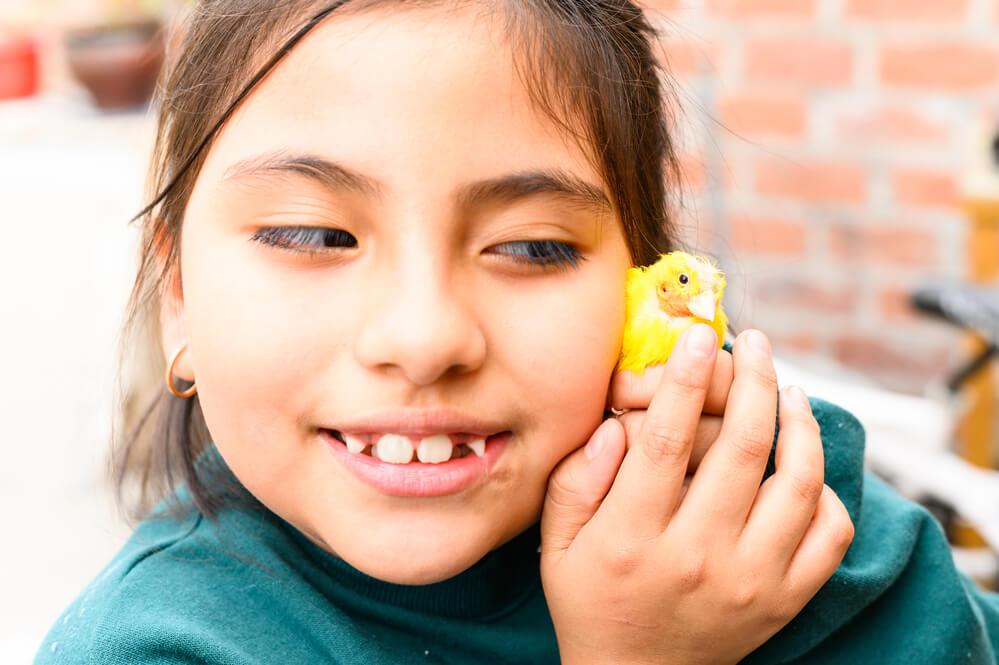
As a bird enthusiast, I’m often asked if canary birds can talk or mimic human speech. Most people think of parrots as the prime talking birds, but canaries possess vocal talents too. In this section, I’ll discuss the canary birds’ ability to learn and communicate using human-like speech.
Firstly, it’s essential to understand that while canaries are not inherently skilled in replicating human speech like some parrots, they do have the capacity to learn and mimic some words and phrases with proper training and reinforcement.
These delightful birds are known for their melodic songs, but their vocal abilities also extend to the realm of human speech imitation.
When it comes to educating a canary bird to mimic human speech, patience and consistency are key. I’ve found that using a clear, consistent tone and repeating the desired words or phrases regularly can help the bird grasp the sounds more easily.
Positive reinforcement, such as praise or treats, is also an effective tool in the learning process.
In terms of communication, it is important to remember that canary birds will not engage in complex conversations with humans. Rather, their speech will be limited to the words and phrases they have been taught.
Nevertheless, I’ve observed that having a “talking” canary bird can create a unique bond between the bird and its owner, as well as entertain guests and spark curiosity about these fascinating creatures.
To sum up, while canary birds are not as adept at mimicking human speech as some other bird species, they do display an ability to learn specific words and phrases. With patience, consistency, and positive reinforcement, a canary bird can be trained to communicate using a limited vocabulary of human words.
This can create special connections and showcase the remarkable intelligence of these feathered friends.
Canaries’ Talking Ability
When it comes to canaries’ talking ability, I can confidently say that these little birds are capable of producing an impressive range of vocalizations. As a songbird species, canaries are best known for their beautiful chirps, whistles, and melodious songs.
While canaries may not be able to “talk” as we humans do, they possess a unique vocal repertoire that consists of various simple sounds, which I find fascinating. These birds have the ability to mimic certain sounds they hear around them. This act of mimicry in canaries displays their remarkable ability to learn and reproduce sounds, much like other songbirds.
As a matter of fact, canaries’ vocalizations are complex enough that they can even pick up specific whistle patterns or tunes played to them.
However, I must emphasize that their capacity to mimic is largely limited to whistles or short phrases, so don’t expect them to deliver full-blown sentences like some parrots can.
While canaries are not known for extensive talking abilities like their parrot counterparts, I can assert that they do have a captivating vocal prowess that makes them beloved pets. Their enchanting melodies and ability to mimic simple sounds are undeniable feats that showcase the extent of their vocal capabilities.
Training a Canary Bird to Talk
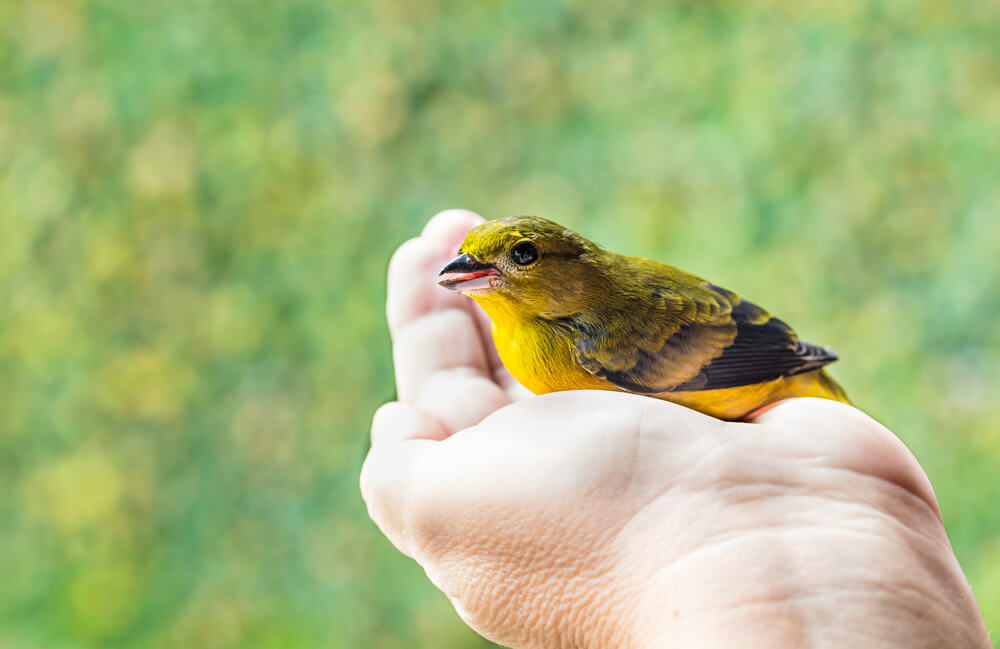
When I first decided to train my canary bird to talk, I knew that patience and repetition would play important roles in the process. As canaries are not as naturally talkative as some other bird species, setting realistic expectations for progress is essential.
I began by socializing with my canary regularly, which helped us build a strong bond. Daily attention is important as it encourages the bird to communicate with me. Canaries thrive on social interaction, so giving them ample attention not only strengthens our bond but also aids in their overall well-being.
To begin training, I chose a quiet, well-lit room with minimal distractions. It’s essential to maintain a consistent schedule and provide a calm environment to ensure the bird focuses on my voice. I would then repeat the chosen words or phrases in a clear, confident tone, making sure to maintain eye contact with my canary while doing so.
To make the training more engaging, I occasionally incorporated simple tricks such as gently raising and lowering my finger while repeating the target phrases. This helped my canary associate the words with a specific action, making it more likely for them to mimic it. Consistency and repetition are key; I ensured that I practiced the same words and phrases in the same tone of voice daily for about 10 to 15 minutes.
As I observed my canary’s progress, I noticed that they began to show more interest in mimicking my voice. It’s important to remember that each bird has a unique learning pace, so being patient is crucial. If my canary did not appear interested or became stressed, I would simply take a break and try again later.
Throughout the training process, I rewarded my canary with praise and treats upon successfully mimicking my speech, reinforcing their progress. Over time, we were able to build on their vocabulary and create a unique bond that allowed for clear communication between us.
Remember that training a canary bird to talk takes time, patience, and dedication. With the right approach, you can develop a strong bond with your canary and enjoy the rewards of their newfound talking abilities.
Impacts of Gender and Age on Talking Ability
In my experience, both gender and age play a significant role in the talking ability of canary birds. When considering Male canaries, they tend to be better at imitating sounds and developing their own songs compared to female canaries, which are generally quieter and less vocal.
As a canary bird matures, its talking ability usually improves. In particular, male canaries go through a period of vocal development at an early age. As they approach their first birthday, they begin singing more complex songs, attracting attention from potential mates.
On the other hand, age does not have a significant impact on the talking ability of female canaries, as their vocalizations remain limited compared to their male counterparts.
The season also affects the talking ability of canary birds, especially in relation to their age. Male canaries typically sing more extensively during the breeding season, which spans from late winter to early summer.
During this time, they seek to establish their territory and impress their female counterparts. Outside the breeding season, their singing tends to be less frequent and less elaborate.
In contrast, female canaries might become slightly more vocal during this breeding season, but the change is not nearly as pronounced compared to that of males. Although a handful of female canaries are known to mimic sounds and develop basic melodies, their singing remains less common and less complex than that of male canaries.
To sum it up, when considering the talking ability of canary birds, both gender and age play significant roles. Male canaries tend to have the upper hand due to their natural predisposition to develop singing skills in order to woo their female counterparts.
Differences Between Canaries and Other Talking Birds
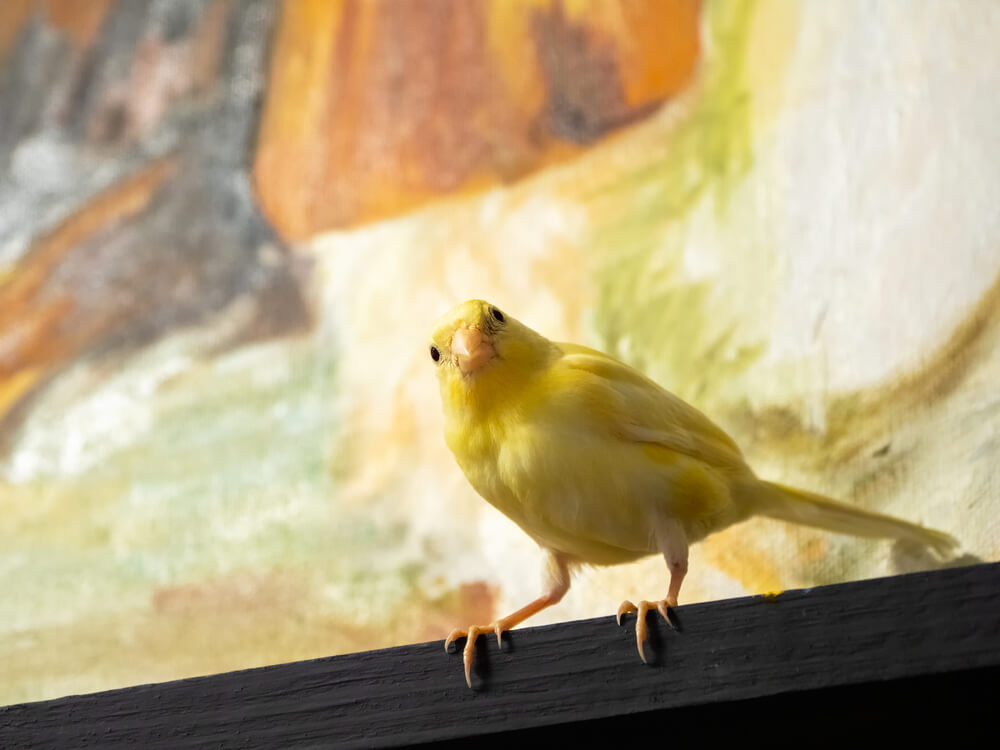
I know that canaries are fascinating birds, renowned for their beautiful singing voices. Yet, when it comes to verbal mimicry and talking ability, they differ considerably from other popular talking bird species, such as parrots, African grey parrots, and even some species of parakeets, like the monk parakeet.
First and foremost, canaries don’t have the same vocal anatomy as other talking birds, particularly those in the parrot family. The syrinx, which is the bird’s vocal organ, differs in structure between canaries and parrots.
As a result, canaries have a more limited ability for vocal mimicry compared to parrots, such as the famous African grey parrot, Amazon parrots, or even macaws.
While canaries may not excel at imitating human speech, their singing talent sets them apart from other birds. The melodious songs they serenade with are unique to each bird and are primarily used by males to attract mates.
In contrast, parrot species like budgerigars (budgies), cockatoos, and Eclectus parrots display their talking abilities in various degrees, from simple words to complex sentences.
In the realm of talking birds, some of the most well-known species include:
- African grey parrots: Known for their intelligence and intricate vocabulary.
- Amazon parrots: Skilled at mimicking human speech and known for their strong personalities.
- Macaws: Intelligent birds with a remarkable ability to learn words and phrases, despite being less renowned for their talking skills compared to African greys and Amazons.
- Budgerigars: Also popularly known as budgies, these small parrots are admired for their charming and sometimes comical chatter.
It’s essential to recognize that not all parrots, parakeets, or cockatoos will necessarily talk, and individual birds within a species can have differing language abilities. Nevertheless, they generally possess a higher aptitude for mimicking human speech than canaries.
While canaries and other talking birds, such as parrots and parakeets, share similarities as captivating avian companions, their talking and vocal mimicry abilities differ significantly.
This is mainly due to their differing anatomy, with canaries specializing in melodious singing and parrots dominating the realm of complex vocal mimicry and human speech imitation.
Factors Influencing Canary Vocalizations
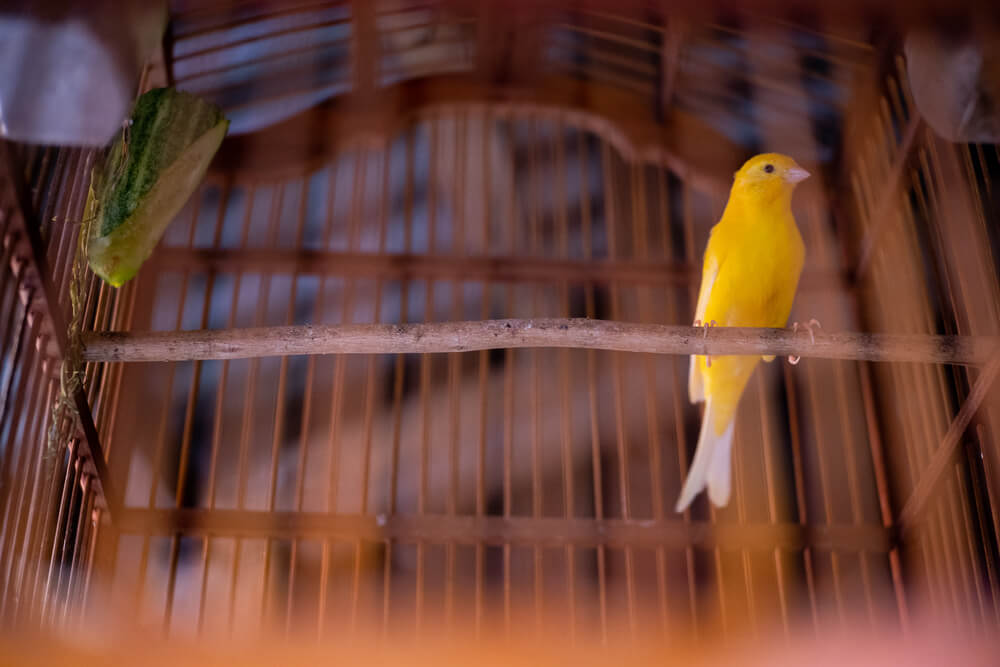
As a canary bird owner, I can attest to the fact that the environment plays a crucial role in canary vocalizations. For canaries to showcase their full vocal potential, they need to feel safe and at ease in their surroundings.
Factors such as clean water, suitable cage size, and a well-balanced diet can greatly impact the quality of their vocal performances.
My canary’s diet consists of a variety of seeds, fruits, and vegetables. I’ve found that flax seeds and hemp seeds are particularly beneficial for their vocal health. Additionally, providing them with fresh water daily is essential not only for their overall well-being but also for their vocalization habits.
In my experience, incorporating fruits and vegetables into their diet has been beneficial to their health and vocal abilities. For instance, most canaries enjoy eating apples, oranges, and bananas, among other fruits.
They also consume vegetables such as broccoli, carrots, and spinach. It’s important to note that a balanced diet leads to more active and vocal birds.
To maintain an optimal environment, I continuously monitor the cleanliness of my canary’s cage because a cluttered space can inhibit their vocalizations. Messy objects or leftover food in the cage can create stress and make it difficult for the bird to focus on singing.
I make sure to clean the cage regularly and remove any objects that may interfere with their sense of comfort and security.
Factors such as environmental influence, diet, and cage maintenance play a significant role in canary vocalizations. Providing optimal conditions, such as a well-balanced diet, clean water, and a tidy cage, can ensure that my canary feels comfortable enough to express itself through its beautiful and unique vocal abilities.
Recognizing Different Canary Breeds and Their Vocal Abilities
As a bird enthusiast, I find it fascinating to study the vocal abilities of various canary breeds. Contrary to popular belief, canaries are not just limited to their chirping sounds but are also capable of producing melodious and intricate songs.
Let me share some information about a few popular canary breeds and their singing capabilities.
The American Singer is a delightful breed known for its beautiful songs. As a result of the crossbreeding of the Roller and Border canaries, this breed exhibits the best vocal qualities from both of its parent breeds.
Males are particularly gifted, often displaying a balance of melodious notes and softer trills. What makes the American Singer stand out is its versatile singing repertoire.
The Belgium Waterslagger, known for its unique and soothing water-like sounds, is another breed worth mentioning. I find it captivating to listen to this breed mimic the sound of water, resembling droplets and running streams.
This canary breed’s vocal skills have evolved over centuries, which is why many bird enthusiasts adore the Belgium Waterslagger.
Finally, the Spanish Timbrado is a popular breed recognized for its bright, clear, and melodic songs. As I listen to this breed, I notice that the variety in its singing, which features complex notes and harmonics, is truly outstanding.
The Spanish Timbrado is often chosen by those who enjoy strong and tuneful canary songs.
The American Singer, Belgium Waterslagger, and Spanish Timbrado are three canary breeds worth recognizing for their exceptional vocal abilities. Each breed has its unique set of melodious sounds, making them a true pleasure to listen to and appreciate.
When Canaries Stop Singing
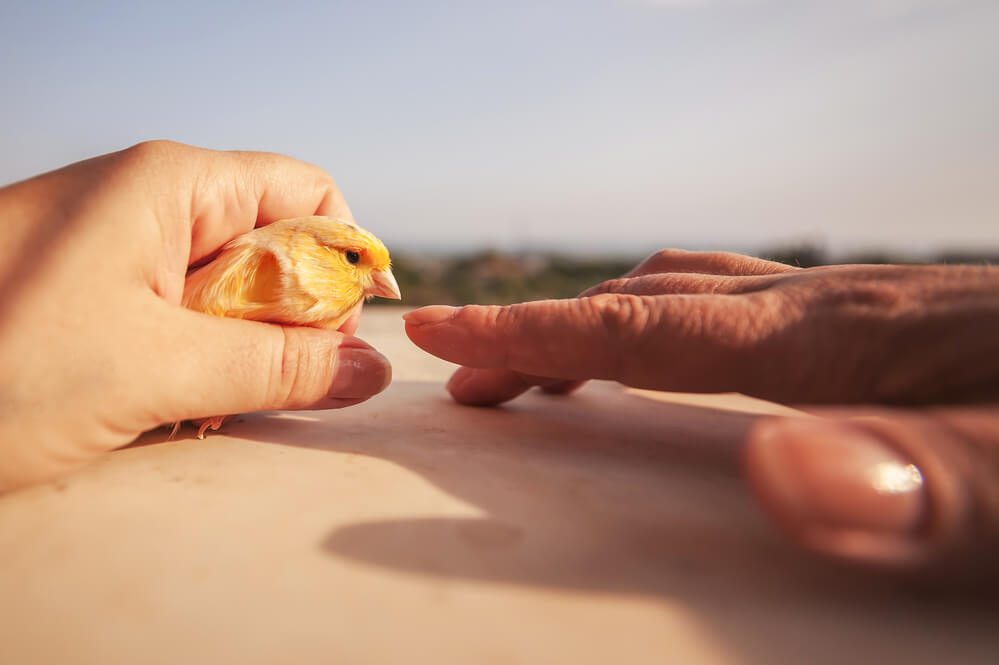
I’ve noticed that canary birds often stop singing due to several reasons. One of the primary reasons is molting. Molting is a natural process that occurs annually when birds shed their old feathers to make way for new ones. This period can be stressful for our little feathered friends.
During molting, canaries become sensitive, and their energy is focused on growing new feathers, causing them to stop singing.
Another reason why canaries may stop singing is their environment. Canaries are social creatures that thrive in flocks. While canaries raised in captivity no longer live in flocks, providing constant companionship or sufficient human interaction is crucial for their well-being.
A lonely and bored canary may stop singing altogether. To keep them happy and joyful, offer them treats and toys that cater to their natural instincts and ensure they’re engaged and entertained.
Lastly, a canary that has stopped singing could be an indication of illness. These delicate birds are susceptible to various health issues that can affect their singing ability. It’s important that I closely monitor my canary for any unusual behavior or changes in appearance, such as weight loss or changes in droppings.
Understanding the reasons why canaries stop singing can help me provide the best care for my feathered companion, ensuring they remain healthy and continue to fill my home with their beautiful melodies.
Frequently Asked Questions
Do canaries have the ability to speak?
I can confirm that canaries do have the ability to mimic sounds, including human speech. However, their ability to talk is limited compared to other birds like parrots or African grey parrots.
How well do canary birds mimic human speech?
Canaries can learn to mimic human speech, but their ability is not as developed as that of parrots or African greys. They may be able to repeat simple words or phrases, but their vocabulary will be limited. Additionally, their voice may be quite high-pitched and not as clear as that of other talking birds.
What types of sounds do canaries typically make?
Canaries are known for their beautiful singing and melodic whistles. They are excellent singers and use their voices to communicate with each other. Besides their lovely songs, canaries can also mimic other sounds in their environment, such as musical instruments or other birds.
Can canaries communicate with humans?
While canaries are not known for their talking abilities, they can form bonds with humans and learn to react to certain cues. This means they can communicate in simple ways, such as responding to a specific call or recognizing their owner’s voice. However, they are not considered to be “talking birds” like parrots and, therefore, have more limited communication abilities.
How do canaries compare to other talking birds like parakeets and cockatiels?
Canaries are not as well-known for their talking abilities as parakeets and cockatiels. Both parakeets and cockatiels are considered better at mimicking human speech, with a greater ability to learn words and phrases. That being said, canaries are great singers and can still mimic some sounds and possibly learn a few simple words.
Are there any specific canary breeds that are known for talking more?
There are no specific breeds of canaries that are known for their talking abilities. While some individual birds may be more apt at mimicking sounds, their talking abilities will depend on a variety of factors such as genetics, environment, and human interaction.

